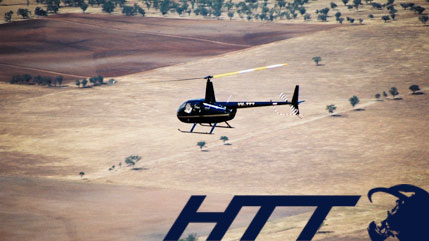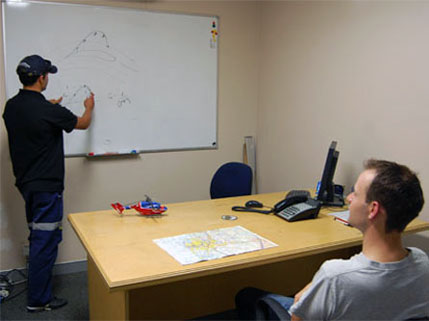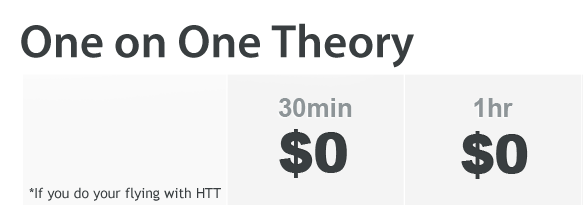Private Pilot's Licence - Helicopter
PPL is a licence which enables the pilot to fly any Helicopter that they are endorsed on while carrying passengers anywhere in Australia. For many that is simply a dream come true.

PPL Helicopter Licence Australia - All you need to know
So, here is what you basically need to know. There are three components to a license - theory, documentation and flying.

PPL Theory Requirements - 1 Exam aprox. 3Hrs. Exam incorporates - Air Law, Aerodynamics, Navigation, Meteorology, Human Factors and Radio topics. Can be sat at any time during your training. We will guide you through the syllabus and if you feel like you need more help, we will offer one-on-one instruction. Completely free of charge provided you do your training and license with HTT.
You will also need to pass a quick English test, in order to qualify for a PPL licence.
Documentation wise you will need to be at least 17 years of age, Holder of a Class 2 Medical (We will help you obtain and refer you on to the doctors who specialize in aviation medical) hold an ASIC (Aerodrome Security Identification Card - we will help you obtain that too)
Flight Requirements:
40 hours total flying
30 hours flying in a helicopter
10 hours solo flying
5 hours solo navigation flying
A pass in the PPL(H) Theory Examination
A pass in the PPL Flight Test
Flying Helicopters

Helicopters have long been considered as complicated aircrafts reserved to a financial elite. In fact, the mechanics of flight are very complex thus a high cost of production and maintenance. Nowadays, thanks to the progress and the use of new materials, manufacturers are able to reduce the operating cost per hour of flight within reasonable limits. However, learning to fly a helicopter remains a big investment and flying a helicopter requires a minimum of technical skills and a sound understanding of the principles and the conditions of flight for a rigorous precision flying.To some people, helicopters are seen as strange machines that seem to be out of reach… Once you get the opportunity to mix with the somewhat exceptional world of helicopter pilots, it becomes an exciting machine with apparently no limits. In fact, men have always been fascinated by the performances and the technical possibilities of helicopters. It is capable of freeing itself from the infrastructure needed by the traditional aviation industry, thus bringing a feeling of total freedom.
Although there are no formal academic entry requirements to start flying, undertaking a flying training course is far from easy but it is achievable providing determination and self-discipline. This is explained by the fact that the complexity of the flying handling is superior to the one of an airplane (natural instability of the machine) and the flying environment involves the proximity of the ground and obstacles. After you experience a trial instructional flight, you might definitely catch the virus that will grow in you the passion of helicopters lesson after lesson. You will soon discover how theory goes hand in hand with the practice and that each flight is always a new opportunity to improve. This is also true after several years of flying where the theory is understood differently when it is backed by a long practice. So the benefits of your learning all come with time and, whatever the experience you gained as pilot in command, it is always a good thing to dive back into a flight manual and avoid flying as a habit.
Should you experience any difficulty or problems in your studying, do not hesitate to ask your instructor for help.
Do not wait until you have to sit an exam. Your flying instructor is also your theory instructor. Our instructors are available at all times to give you a personal theory support as required to see you achieve passes on your exams.

One-on-One Training Plan
You will receive a detailed Mass Briefs Handbook including lessons with specific learning outcomes and theory briefs.
This flying lessons handbook is a progressive series of Air Exercises in which the helicopter pilot is required to be proficient (the air exercises are listed under main titles). The initial flights will be confined to a particular exercise but as your flying training progresses revision on previous exercises will be done as well as introduction to more advanced exercises. The main considerations of each exercise will be stressed during full and pre-flight briefings. The principles of flight are discussed in this handbook under several Theory Briefs. The information given in this handbook, together with ground school instruction, is the foundation upon which your instructor will base your helicopter flying training.
We understand that you have a busy schedule, this is why we make sure that you can book one-on-one training sessions in one of our private briefing rooms. Classroom learning does not get more personal than this.
Each flying lesson or sortie follows a structured one-on-one training plan as explained below:

Pre-flight Knowledge
At HTT we believe that Preflight and Postflight briefs are essential to any training flight. This is why they are free, always
This is the preparation phase before undertaking a flying sortie. Your instructor will point to you which elements of aeronautical knowledge should be learnt as an underpinning knowledge to a particular air exercise or as a relevant knowledge of importance according to your flying stage (pre-solo, post-solo, general flying phase, PPL level and CPL level). For example, on your first sortie 'Air familiarisation and Effects of Controls' you should be aware of several air legislation about a pilot's fitness and health and therefore take the good habit of asking yourself throughout your flying training: "Am I safe for flying?" The pre-flight knowledge is the foundation upon which your instructor will base your helicopter flying training.
Full Briefing
The full briefing is given before each new exercise is taught in the air. As the name suggests this briefing covers the subject in detail. During this briefing the knowledge learnt during your self-study pre-flight knowledge is linked to the practical and safety aspects of flying. We believe our lesson briefs are a vital role in making you a safe pilot. We have structured over an hour of time (or even more) to spend with you to fully explain your sortie with your instructor.
Pre-Flight Briefing
Pre-flight briefing is given just before each flight. As well as including a resume of the main points of the air exercise, the briefing will also cover details which will affect the conduct of the flight, namely weather, airfield state and air traffic control.